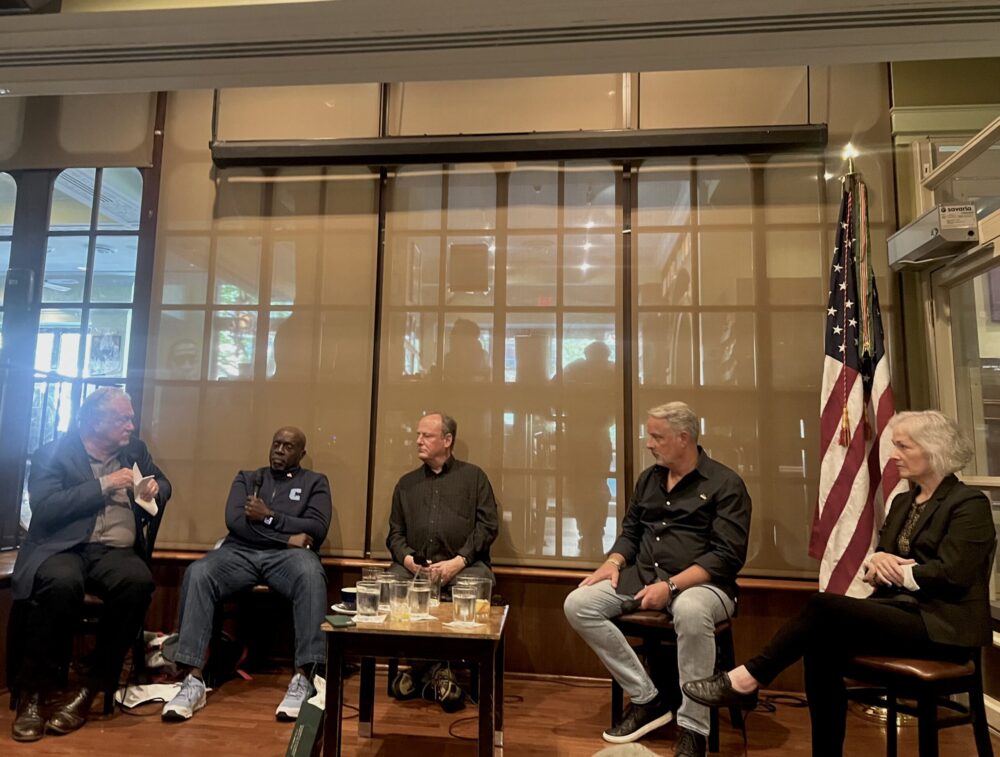WASHINGTON – Former U.S. ambassadors warned Tuesday that democracy is at serious risk under the Trump presidency, drawing parallels between the administration and past autocracies and urging Americans to stay vigilant.
“We’ve served our nation. We’ve served presidents, Democratic and Republican…we love our democracy and we want to see it continue,” Harry Thomas, former ambassador to Zimbabwe (2016-2018), said at a panel in downtown Washington. “I think criticizing a president is part of democracy—nonviolent criticism is part of democracy.”
The event, hosted by local bookstore and community space Busboys and Poets, featured a nearly 90-minute discussion between journalist Jon Lee Anderson and four former U.S. diplomats: Thomas, former deputy chief of mission in Moscow Eric Rubin (2008-2011), former ambassador to Panama John Feeley (2015-2018) and former ambassador to Ukraine Marie Yovanovitch (2016-2019).
The discussion came a week after the four joined almost 200 other former American diplomats and national security leaders in signing an open letter entitled “The Assault on American Democracy: A Call to Action.” The letter warned that U.S. democracy and global leadership are under threat, and said defending them from authoritarianism will require unified, urgent resistance.
“The challenge comes from within, as President Trump and his administration have assaulted the pillars of our democracy here at home and our strength around the world,” the letter said. “American democracy and American security are inextricably linked; weaken one and the other inevitably begins to fail…We see that link unraveling at lightning speed.”
Anderson opened the discussion by outlining what he called the “universal autocrat playbook,” a set of tactics historically used by tyrants around the world to turn democracies into dictatorships.
Among them: eliminating checks and balances, silencing opposition, instilling fear and confusion, attacking the press and spreading disinformation, leveraging nepotism and cronyism, targeting vulnerable groups, promoting exclusionary patriotism, disregarding due process and rewriting the constitution to expand executive power.
“Does any of that sound familiar?” Anderson said, referencing the president’s sweeping actions in his first 100 days and laughing alongside the other panelists.
Using the playbook as a framework, the ambassadors drew comparisons between the Trump administration’s early moves and patterns they witnessed while serving in countries where democratic norms were gradually dismantled.
“Autocracy is a lot like a virus,” Feeley said, quoting Nicaraguan political activist Félix Maradiaga. “If your body’s autoimmune system doesn’t pick up the virus by the time you show symptoms, it’s probably too late. That’s why we’re here today…This kind of event — nonviolent, respectful, apolitical — is about the autoimmune system of a democracy.”
As Zimbabwe’s democracy crumbled under former President Robert Mugabe, Thomas saw the collapse of the economy along with sharp declines in agriculture and tourism.
In Russia, Rubin watched President Vladimir Putin’s government weaponize the military against its own people.
In Nicaragua, Feeley witnessed as President Daniel Ortega stacked leadership positions with loyal friends and family.
And in Ukraine, before Volodymyr Zelenskyy became president, Yovanovitch saw Russian fear-mongering and threats against educational institutions as the country faced renewed invasion.
Rubin urged the audience to put aside what he called a uniquely American optimism when evaluating the Trump administration’s efforts to curtail civil liberties.
“If we wake up one morning and you hear about something really terrible, please don’t say there must be an innocent explanation. Please don’t say that in our country, things like this are not intentional,” he said.
Throughout the panel, the diplomats stressed the importance of standing up for democratic values through both individual and collective action, even in the face of repression and fear.
“The playbook, as we’ve seen, is to go after the most vulnerable. We need to have community as our shield,” Yovanovitch said. “Change is slow, and then it happens really quickly.”

